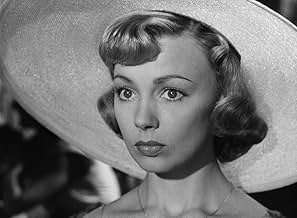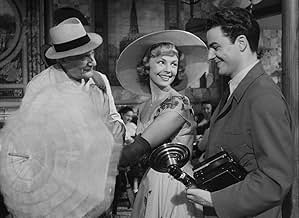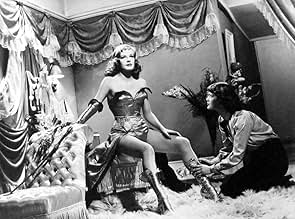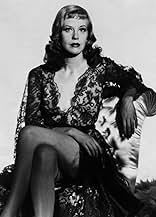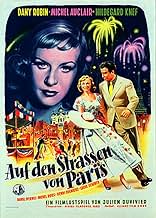After the rejection of their latest--preposterous--scenario, two scriptwriters get back to basics to prepare a new movie. The new scenario centers on Henriette, a pretty, lively Parisian, an... Read allAfter the rejection of their latest--preposterous--scenario, two scriptwriters get back to basics to prepare a new movie. The new scenario centers on Henriette, a pretty, lively Parisian, and how she spends the 14th of July in Paris with her fiancé. We follow the tribulations of ... Read allAfter the rejection of their latest--preposterous--scenario, two scriptwriters get back to basics to prepare a new movie. The new scenario centers on Henriette, a pretty, lively Parisian, and how she spends the 14th of July in Paris with her fiancé. We follow the tribulations of Henriette as various other characters enter the story and turn a traditional festive day i... Read all
- Director
- Writers
- Stars
- Rita Solar
- (as Hildegarde Neff)
- Un scénariste
- (as Louis Seigner de la Comédie Française)
- …
- Un faux déménageur
- (as J.L. Le Goff)
- Dédé
- (as J. Clarieux)
- Director
- Writers
- All cast & crew
- Production, box office & more at IMDbPro
Featured reviews
The performances are delicious with Dany Robin at her most enchanting whilst Georges Auric's scintillating score, Roger Hubert's camerawork and the cutting of Duvivier's editor of choice Marthe Poncin, notably in the splendid chase sequence, contribute to the creation of an overlooked Gallic gem.
On the principle that bigger is not necessarily better, it is probably kinder to pass over in silence Richard Quine's expensively mounted but leaden remake.
I won't get into a discussion of Duvivier's place in cinematic history, nor whether we needed the New Wave or not, nor even the use of film-within-a-film. I will just say that this is a very inventive and charming little comedy that really should be on DVD. There is a tremendous virtuosic sequence about 60 minutes in--Marcel tries to rape Henriette in a car, she escapes and he chases her up the stairs in a building under construction--that must be seen to be appreciated.
First. I was always (since its release) very fond of "Le Magnifique" (1973), almost the only Belmondo one I love (I wrote/detailed the French Wikipedia article). It's the story of a writer (Belmondo) who writes a spy/thriller book, who meets a beautiful student lady (Bisset), who encounters problems with his publisher and who, finally, mixes all these elements in his book. It means we movies goers can watch two stories with the very same actors, in the real world and in the book. Without any doubt (imho), "Le Magnifique" is one of the ten best French comedies ever.
I was indeed very in love with the idea of throwing the reality in the fiction. Of course I knew it was not the first time some Mise en Abyme was put in a film but it was obviously the first time with a writer avenging his poor real life in his books.
Second. Then, recently, TCM Europe showed a lot of Audrey Hepburn movies I never saw. Among them was "Paris - When It Sizzles" (1964), with William Holden. Right after a few minutes I knew for sure where the idea of "Le Magnifique" came from! Holden plays a screenwriter who is very late in delivering his next opus and Hepburn is sent to him in Paris by the Hollywood producer to speed up the writing. Besides the predictable love story, the film divides itself in two parts, their reality and the fiction they're writing together and Hepburn (150% fabulous as always) and Holden play the four characters. The movie is real fun end very entertaining and very intelligently conceived.
Third. Knowing a new gem like this "Paris", I read on the net (en.wikipedia for instance) everything I could about it, whoa, just to learn it was an adaptation of a French movie, "La fête à Henriette" (1952). By chance, there was some discussion about it on an IMDb board and, as wrote user Benoît A. Racine in his comment, "A pen pal from the IMDb was good enough to send me a VHS copy of this French classic unavailable in America." I got a DVD instead he he and, as well, the film is not watchable in Europe. Many thanks again to "him" for his help and his sending to me the Duvivier one.
I finally watched it and noticed all converging points between "Paris" and "Henriette". Let's say "Henriette" is much more conceptual and less entertaining than "Paris", more of a game with the spectator and less of a logical story form A to Z (it's not its goal anyhow). Clearly the biggest difference with "Paris" and "Le Magnifique" is the fact that the actors of the reality (the writers of a script and their numerous secretaries) do not play in the fiction. The main point according to me is really: more conceptual.
Besides, it's pretty fun to see some actors (Auclair, Seigner, Roux) quite young in "Henriette" because they were known at that time and later more as second range stars: their true career came later, in the movies or on the stage. Robin was an important star in the 40s and 50s.
If you want to learn more: Reading over here all comments by reliable IMDb users rastar-1, dbdumonteil, writers_reign and Benoît A. Racine will bring you everything relevant you need about the movie: the plot, the style, the inventive director, the great actors, etc.
Finally, I have to confess I have not seen a lot of Duvivier's movies: I know very well "Marianne de ma jeunesse", which is a very special story, plenty out of time, deeply concerned with poetry and fantasy; I know as well the two "Don Camillo" he made with Fernandel; "La Femme et le panting" with Bardot from a book by Louÿs I read; "La Belle équipe" with Gabin... and it seems to be all. To bad because only "Marianne" and "Henriette" show he is a very important director in history, much more than most of the Nouvelle vague ones, and who was a visionary. Very worth to see, both the movie and any other film by him. "Henriette", a must see!
What this synopsis doesn't say is that this movie has a very unconventional narrative structure. It unfolds, develops, rolls back on itself and starts again according to the whims, arguments and opinions of the two on-screen screenwriters, their wisecracking female typist and their two girlfriends, while they go about everyday activities like going to the barber or fixing dinner. One of the scriptwriters (Henri Crémieux) fancies himself an anarchist and revolutionary (long before the New Wave) while the other (Louis Seigner) is more of a practical-minded classicist. The first one is always insisting on improbable and melodramatic turns of event, murders or suicides, while the other wants to keep things light, realistic and entertaining. All through the film, scenes and characters are introduced, analyzed and disposed of, resurrected or simply erased from the record. The result is one of those unknown masterpieces of French cinema that will probably stay unknown in America until the Criterion Collection takes a fancy to it.
This film boasts magnificent set pieces, female nudity, sexual situations, witty dialogue, unbelievably risky photography and stunts. Its editing also makes "Citizen Kane" look a student film. But it is most of all revolutionary in its narrative structure. It has been remade twice, as "Paris when it sizzles" (1964) and "À l'attaque" (2000). Even if the first of these remakes was a relative failure, it was also the first mainstream American comedy to call into question the narrative clichés and conventions of Hollywood film-making. The film is taking liberties with the space-time continuum in ways that would inspire numerous films as diverse as "Zazie dans le metro", "Adaptation", "Run, Lola. Run", "Amélie", the later comedies of Sacha Guitry and even the relatively few lighthearted moments of Truffaut's "Shoot the Piano Player".
To this day, anyone who knows about this film which gives cinematic story-telling the unlimited potential of a radio play - is sill in awe of its wonders.
I have a question for anyone who has seen this film or only heard about it: "Even though it would seem the most natural thing to do, in movies, for a director to play with the space and time structure of his story, can you think of any example previous to 1952 where an on-screen scriptwriter intervenes to change the run of the story?"
The only examples that come to my mind are both by Preston Sturges. There is a short sequence in "Sullivan's Travels" where Joel McCrea, as a director, toys around with the story of a film he wants to make called "Brother, Where Art Thou"; and another one in "Unfaithfully Yours" where the conductor-hero plans a murder in his mind that doesn't quite turn out as expected in reality. But even these examples don't involve the re-writing of the film's storyline as it goes along My question also eliminates any time-travel-type science-fiction film as well as films that straddle the borderline between dreams and reality like René Clair's "Belles de nuit" (1952).
"La Fete à Henriette" did not come out of the blue:it's the son of "Sous le Ciel de Paris" one of his most extraordinary achievements.I will try and explain the connection:the 1951 work was made of little stories ,subplots -"Magnolia" was not that much an innovation for that matter- and Duvivier already displayed a compassion for his characters ,he was some kind of puppet master ,a God in miniature who was fascinated by the whims of fate.
"La fete à Henriette" is at first a more demanding -less entertaining maybe -,more free-form ,but when you've watched it ,all you have got to do is stand and applaud.There are many more ideas and innovations than in ,say,Truffaut's "day for night" ("la Nuit Américaine").
Two scenarists see their last screenplay banned by the censorship .That 's why the movie begins with ???? and ???? and ????? in lieu of cast and credits.They've got a whole screenplay to write,and according to the mood they are in,"La Fete à Henriette" will be in turn romantic,dramatic,zany , satirical,you name it.Henri Jeanson lets his inspiration flow and his lines,his ferocious lines never lose their bite ( A VIP from the French government is about to die and the journalists around the mansion are exchanging nice lines such as: "the ideas he has! dying on the 14th of July! or "Hope he 'll kick the bucket before aperitif time!")
It is Henriette 's fete ,the 14th of July ,French Bastille Day!A gorgeous girl ,played by the young romantic female lead of the era ,Dany Robin (most of the users saw her in Hitchcock's "Topaz"),has a fiancé , a photograph who has a -professional,that's what he says that is- rendezvous with a glamorous horsewoman (Hildegarde Kneff).Henriette is cross and she starts to flirt with the first to come .That character whose name is subject to several changes is played by highly talented Michel Auclair.The narration is not linear ,since Auclair's character is now a crazy person fresh from the asylum (and Jeanson gives one of his best anti-militarist lines ever- Auclair to a general:"you see me and you do not stand to attention!),now a b..... who tries to rape the heroine,now a hoodlum with a big heart,now a wealthy family's son....The whims of fate! Duvivier himself reveals as he never did in this work:although it's meant to be a "happy" tale,his legendary pessimism resurfaces now and then.
Duvivier's style is constantly superb and the camera work is dazzling.When the story (ies) become(s) too far-fetched ,the scenes are filmed obliquely.The plot often stops since the two writers do not agree and they have endless discussions about what will happen next.They even quote their colleagues: one of them mentions the script (a news item in the paper he's reading ) of "ladri di biciclette " ("That would not make a good film!") ;later they will parody Marcel Carné as they introduce for a short while a blind man who epitomizes ...fate of course (remember "les Portes de la Nuit").Even the last scene of the fireworks verges on a spoof on romantic drama.You can go as far as to write that Duvivier appropriates René Clair' s "Quatorze Juillet" ,but he effortlessly beats his predecessor at his own game.
Expect the unexpected and till the last pictures! The unexpected final twist is witty and as the cast and credits finally appear after the final "revelation" ,we feel how much "Henriette" was ahead of its time,not only because it was remade by Richard Quine in the sixties ( the so-so " Paris when it sizzles) but because many of its strokes of inspiration we found them back in such later works as Michel Drach's "Les Violonsdu Bal" (the subject has nothing to do with "Henriette" but it imitates the ending)or Peter Weir's "Truman Show".
Did we need the Nouvelle Vague so bad when we had a great director like Duvivier?A writer like Jeanson? WE DIDN'T!!!!
Did you know
- TriviaFrench censorship visa # 13195.
- Quotes
Un scénariste: What if we simply told a love story?
Un scénariste: Between two women?
Un scénariste: Between two women?
Un scénariste: What? Between two men?
Un scénariste: Idiot!
Un scénariste: Between who and who then?
- ConnectionsReferenced in Kedamono no iru machi (1958)
Details
- Release date
- Country of origin
- Language
- Also known as
- Holiday for Henrietta
- Filming locations
- Production companies
- See more company credits at IMDbPro
- Runtime1 hour 58 minutes
- Color
- Sound mix
- Aspect ratio
- 1.37 : 1
Contribute to this page


